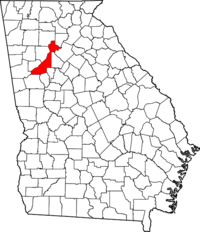Tom Tidwell
Tom Tidwell was a candidate for an at-large seat on the Atlanta Public Schools Board of Education in Georgia. He lost during the general election on November 5, 2013.
Biography
Tidwell received an economics degree from Georgia State University and earned a law degree from The University of Georgia School of Law. He has been practicing law for 21 years. He is on the Board of Trustees at Northside Methodist Church, the Vice-Chairman of the Buckhead Council of Neighborhoods, a Board member of the West Paces Northside Neighborhood Association and recently served on the Morris Brandon school council task force.[1]
Elections
2013
- See also: Atlanta Public Schools elections (2013)
Tidwell ran for the at-large seat 8 against Dave Walker, Reuben McDaniel, Cynthia Briscoe Brown and Mark Riley on November 5, 2013. Opponents Reuben McDaniel and Cynthia Briscoe Brown faced each other in a runoff election on December 3, 2013.
Results
| Atlanta Public Schools, At-large seat 8 General Election, 4-year term, 2013 | ||||
|---|---|---|---|---|
| Party | Candidate | Vote % | Votes | |
| Nonpartisan | 36.8% | 16,256 | ||
| Nonpartisan | 25.8% | 11,410 | ||
| Nonpartisan | Mark Riley | 18.1% | 7,998 | |
| Nonpartisan | Tom Tidwell | 15.1% | 6,689 | |
| Nonpartisan | Dave Walker | 4% | 1,757 | |
| Nonpartisan | Write-in | 0.2% | 90 | |
| Total Votes | 44,200 | |||
| Source: Fulton County Board of Election, "Election Results," accessed October 30, 2017 | ||||
Funding
Tidwell reported $61,818.94 in contributions and $33,497.56 in expenditures to the Georgia Government Transparency and Campaign Finance Commission, which left his campaign with $28,321.38 on hand.[2]
Endorsements
Tidwell received an endorsement from BuckheadView.[3]
Campaign themes
Tidwell identified the following campaign themes for 2013:[4]
Graduation rates
|
Atlanta Public Schools has a fundamental problem; it is not educating our children. During the past four years of the current Board leadership, graduation rates have dropped significantly. Far too many children drop out before graduating. The graduation rate is an embarrassment to the City of Atlanta and to each of us as citizens. It goes without saying that we must increase the graduation rate, but we also need to make sure that our graduates are prepared to move on to their next step in life, whether it’s college, work or some other pursuit. Too many students enter high school without the basic skills necessary to succeed, such as reading and writing. This is not a problem you can fix overnight, and it is not a problem that starts in high school. It is inexcusable to have a ninth grader that reads at a 5th grade level. We cannot accept or condone social promotion in the early grades. We need to make sure 9th graders arrive with the proper educational fundamentals, and once they arrive, we need to make sure they stay on track. High school students are young adults, but they still need our guidance and help to navigate the distractions that present themselves. |
Increasing early education programs
|
We need to increase K-3 educational programs for our children. Our goal should be for every 3rd grader to read at or above grade level. Anything less than a 100% success rate is unacceptable. In 3rd grade, children stop learning to read and begin reading to learn. If our children are not reading at grade level by the end of 3rd grade, then they start to fall behind. They lose confidence and self-esteem and become increasingly frustrated with school. These are the children who are most likely to become disciplinary problems in middle school and dropouts in high school. If our children are struggling, we need to identify them early and reach out to them while we can make a difference and get them back on track. If we wait until 9th grade, the train has already left the station. |
Reducing class size
|
The State of Georgia sets a maximum class size for each grade level at public schools. Each year under the leadership of my opponent, the Board of Education has requested a waiver of the State-mandated class size limit and maximum class sizes at APS have increased by 25%. This is simply unacceptable. Increasing class sizes diminishes the learning experience for every child, but it has a disproportionately negative affect on young children (grades K-3) and children from impoverished areas. The more children you squeeze into a classroom, the more disruptions you have and the greater potential for school ground violence. Most studies show a positive effect between smaller class sizes and academic performance, especially for younger children. There is not a single published study I know of that even suggests larger classes enhance the educational experience for children. Of course, we don’t need a study to tell us what we, as parents, already know. When my second child was born, it was far more than twice the work of having only one child. When we have a play-date with 8 children, it is more than twice the amount of work compared to having only 4 children visit. Next school year, 2013-14, some 4th and 5th grade teachers could have 33 students in their class room, 8 more children than they had four years ago. Ask your child’s teacher if they can be as “effective” with 33 students rather than 25 students. The real tragedy of this misguided policy is that the children who suffer the most are the ones who need our help the most. There is a reason the State of Georgia has mandatory maximum class sizes. There is a reason why private schools, with a financial incentive to increase class sizes, refuse to do so. APS and the current Board are failing our children by repeatedly requesting a waiver from the State maximum class size limits. |
Reforming the budget
|
Everything I have discussed above takes money, but APS already has the money to accomplish these goals. Revenue is not the problem. We don’t need more money – we don’t need to raise property taxes. Spending more money is not the solution. APS spends more money per student than any other school district in Georgia and more than most school districts in the nation. We need to spend the money we have more effectively. We can do more with less. Spending the money we have more effectively will improve our schools. To accomplish this, we must drastically reform the budget process. The first step is to implement financial accountability. We need to find out where the money is being spent, and then redirect it so more money goes into the classroom to be spent on teachers and supplies rather than administrative expenses downtown. Over the past four years, teacher salaries have been frozen but salaries for administrators downtown have increased significantly. One high-level administrator received $68,000 in raises from 2008 to 2012. This raise alone would be enough to pay for a teacher. Another administrator received $27,000 in raises over the past 3 years. This is fiscally irresponsible, especially at a time when most of us in the private sector are struggling to pay bills, including our property taxes which fund these raises. |
Reform the current model: Decentralize decision making
|
Atlanta Public Schools is not a one-size-fits-all school district. We have schools in very wealthy areas and schools in areas where parents are struggling mightily. Such a disparate school district cannot be governed effectively by bureaucrats in a downtown office. We must decentralize decision-making control and give principals more autonomy over their schools, staff and children. Principals are in a far better position than downtown administrators to know what their students need the most. To accomplish this goal, we will need to find a dynamic new Superintendent that is willing to change the paradigm of public education. We simply cannot afford to continue under the current model which does not work and has not worked. |
Reduce violence in schools
|
Children cannot learn if they are afraid to attend school. Parents are less likely to support a neighborhood school when their first thought each day is “I hope my child doesn’t get hurt at school.” We must work to reduce violence, which includes bullying, in our schools so children are not afraid to attend school and parents are not afraid to send their children to school. Many of the policies outlined above will help, such as reducing class sizes and engaging students at an early age so when they reach high school they are thinking about college and not dropping out. |
Note: The above quote is from the candidate's website, which may include some typographical or spelling errors.
About the district
- See also: Atlanta Public Schools, Georgia
Atlanta Public Schools is located in parts of Fulton County and DeKalb County, Georgia. Atlanta is the county seat of Fulton County. Atlanta is home to 443,775 residents.[5]
Demographics
Atlanta underperforms the state in median household income and poverty rate, but outperforms the state in higher education. According to the 2010 Census, the median household income in Atlanta is $45,946 compared to Georgia's statewide median of $49,736. The rate of residents below the poverty level in Atlanta is 23.2% while the state rate is 16.5%. The percentage of residents over 25 with a bachelor's degree or higher in Atlanta is 46.1%, compared to the state average of 27.5%.[5]
|
| |||||||||||||||||||||||||||||||||||||||||||||
Note: Percentages for race and ethnicity may add up to more than 100 percent because respondents may report more than one race and the Hispanic/Latino ethnicity may be selected in conjunction with any race. Read more about race and ethnicity in the census here.
Recent news
This section links to a Google news search for the term "Tom + Tidwell + Atlanta + Public + Schools"
See also
External links
Footnotes
- ↑ Tom Tidwell for APS Board of Education Seat 8, "Meet Tom," accessed October 30, 2013
- ↑ Georgia Government Transparency and Campaign Finance Commission, "McDaniel III, Reuben R," accessed December 26, 2013
- ↑ BuckheadView, "Commentary: BuckheadView’s city elections choices," accessed October 30, 2013
- ↑ Tom Tidwell for APS Board of Education Seat 8, "Tom on the issues," accessed October 30, 2013
- ↑ 5.0 5.1 5.2 2010 Census: Quick Facts, "Atlanta," accessed October 23, 2013"
- ↑ Fulton County Registration and Elections, "Archived Election Results," accessed October 23, 2013
State of Georgia Atlanta (capital) | |
|---|---|
| Elections |
What's on my ballot? | Elections in 2024 | How to vote | How to run for office | Ballot measures |
| Government |
Who represents me? | U.S. President | U.S. Congress | Federal courts | State executives | State legislature | State and local courts | Counties | Cities | School districts | Public policy |




